Overuse of inverted commas isn't a new phenomenon:
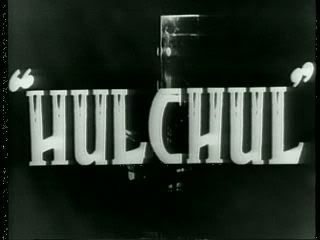
Somebody had fun with fonts:
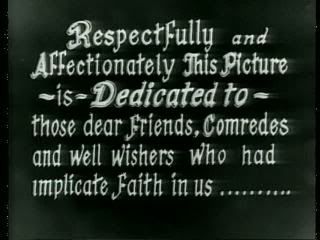
Oh, hi, haven't seen you for a while:
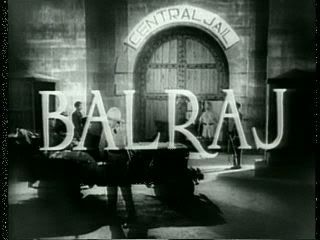
Happy reunion, prison style:
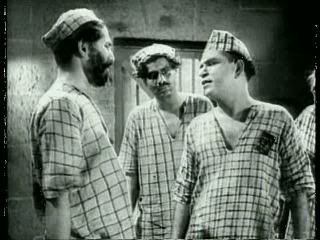
The odd one out:
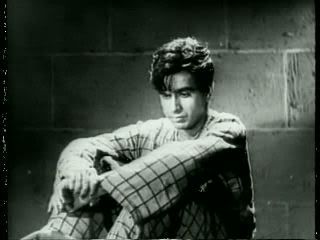
Before the new prisoner can be quizzed any further the conversation is interrupted by the sound of wedding music and we learn that the jailer (Balraj Sahni) is getting married. Just as he is about to remove the bride's veil (after reciting some appropriate poetry) the prisoners try to escape and he is called duty. In the ensuing fight (much of which takes place in the sort of corridor which reminds me of older Dr. Who episodes), the new prisoner saves the the jailer's life. The jailer thanks him, but still puts him back into the same cell with the other prisoners who all wanted to escape. Luckily for him, the would-be killer is actually grateful to have been spared from becoming a murderer (he is a pickpocket when not in prison) but is also intrigued as to why the new prisoner, whose name, Kishore, we finally learn, rescued the jailer. He says that when he heard that the jailer was getting married he felt as if he was getting married and that if his new wife had become a widow he would have felt as if Asha had become a widow. The natural question - who is Asha - is asked, and the explanation requires a flashback.
Mystery bride:
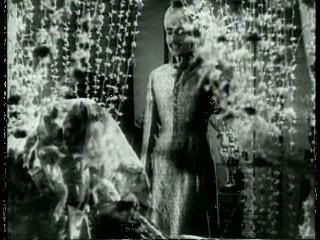
Are you sure you want to do that:
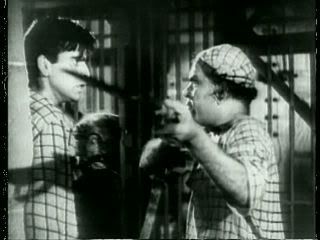
What have I done?
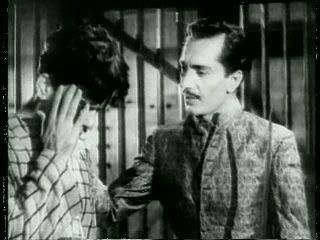
And what is he going to do?
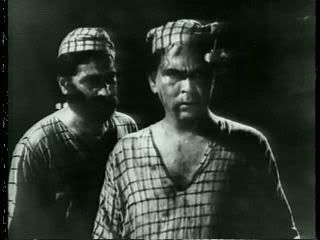
Actually, listen to him for the next 90 minutes or so:
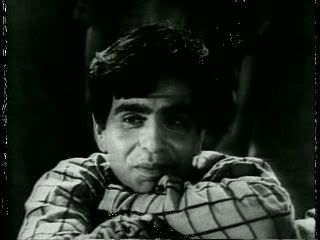
Kishore doesn't remember his parents, but he grew up in a wealthy's Thakur's family, as his father had been a close friend of the Thakur's. Unfortunately, the Thakur's son isn't best pleased with his presence in the family, while the daughter, Asha, who is the same age as Kishore, is his constant companion. One day, Kishore and Asha get permission to go to the fair (they are still young, they don't know any better), while the brother has to stay at home because he didn't do his homework. When Kishore and Asha come back, the Thakur has fallen seriously ill (one obviously doesn't need to go to the fair personally for bad things to happen) and dies shortly afterwards. His son banishes Kishore to the stables; however, Asha continues to spend a lot of time with him. Years pass, the Thakur's son grows up to be K.N. Singh, Asha grows up to be Nargis, Kishore is still doing all the work and lives in the stable, and Asha still spends a lot of time with him. The two are obviously very much in love, but at the same time Kishore is very aware that this relationship doesn't have much of a future.
Moderately happy times:
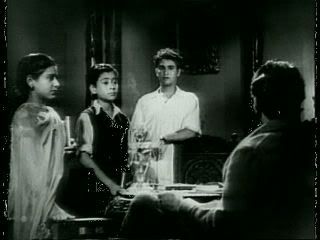
Decidedly less happy times:
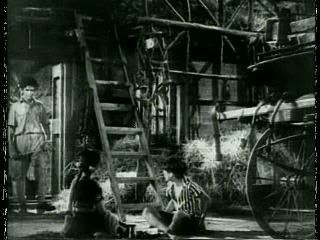
Some relatives just aren't good news:
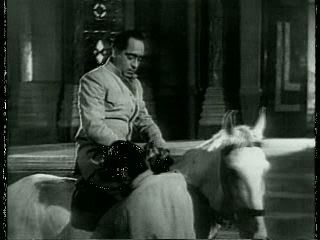
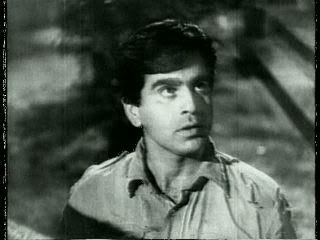
Aaaaaw:
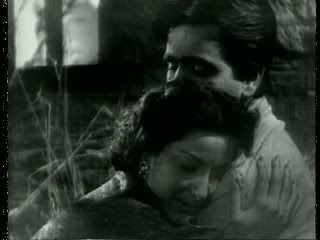
One night, the two lovebirds go out to the nearby village to watch a dance (and I am very grateful that they didn't make Nargis dance) which is also our first song. It's rather nice and it features a Cuckoo. They proceed to spend the night under a tree close to a stream, exchanging pleasantries and finally falling asleep at arms'-length from each other. Alas, they are spotted by Asha's brother and he beats up Kishore and locks up Asha in her room. After a period of exchanging longing glances, Kishore and Asha decide to elope. They are, however, spotted by her brother, who guilts Asha into staying behind (no girl from our family ever eloped, what will happen to our honour ...) but who also grudgingly agress to Kishore's request to give him some time to earn money and become a suitable husband for Asha. The time limit he sets is vague to say the least (as long as a decent family can keep a girl unmarried), but Kishore is satisfied and leaves.
So much happiness, this early in the movie, it worries me:
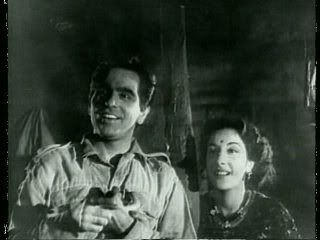
Sitting pretty:
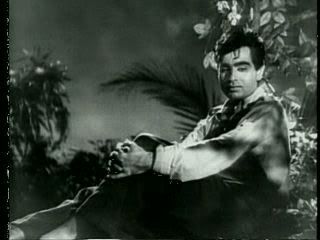
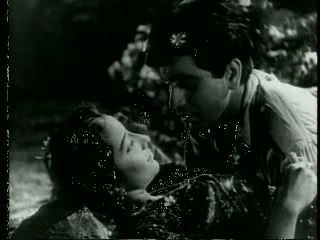
Unexpected brother:
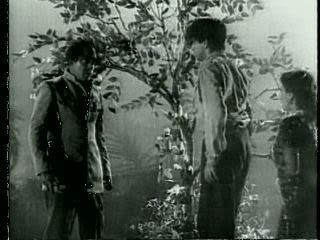
Pining, advanced class:
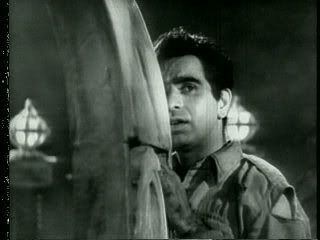 Direct
Direct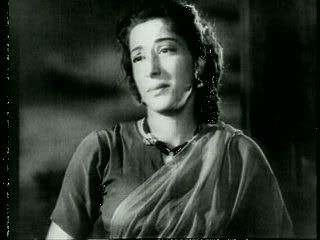
This isn't the face of sanity:
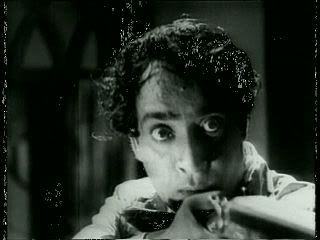
Kishore makes his way to the city, but he finds it very difficult to find work. This of course, doesn't stop him from singing a sad song he shares with Asha. Hungry, thirsty and close to despair, he finally is hit by a car, driven by the owner of a carnival, Neelam (Sitara), who takes him home to her very impressive mansion, and decides to keep him. This doesn't go down well at all with one of her employees, Paul (Jeevan), who is rather interested in her. He decides to refuse to work for her (his job is climbing a long ladder, setting himself on fire and jumping into a tub of water covered in burning oil) which would land her in trouble with the public, but Kishore decides to take the job (after all he is very motivated to earn a lot of money fast.
We also learn that Neelam may not be a paragon of mental stability. If she likes something, she likes to keep it, regardless of whether it wants to be kept or not, so she has a living room full of stuffed animals (and fish). Paul, meanwhile, has thought solace in a musical performance (which gives us our next song) but is more than a little upset when he hears that he has been replaced in his professional capacity by Kishore.
The whole becoming rich fast thing is proving to be difficult:

People with this sort of house often turn out to be less than pleasant:
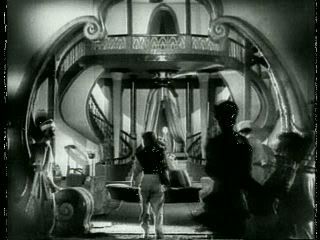
Are you doubting my sanity?

How can you prefer Kishore to me:
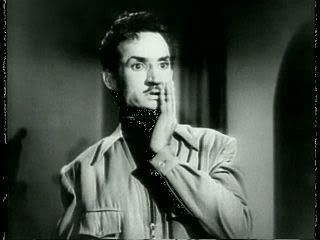
I would try and avoid being added to that collection:
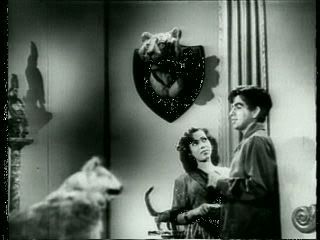
It's a shame she is only with us for one song:

Back at her house, Neelam tells Kishore that she is very happy tonight, and that being happy makes her want to dance. We are treated to a songless dance performance with an amazing number of lampposts. Kishore, who has been told that Neelam will be dancing only for him, seems to be enjoying himself, at least up until the point when Paul turns up and starts beating him. (I was very stressed the first time I saw this, as I feared that Kishore would start imagining Asha on the stage, but to my great relief he doesn't)
I would hate to have to dust all those drapes:
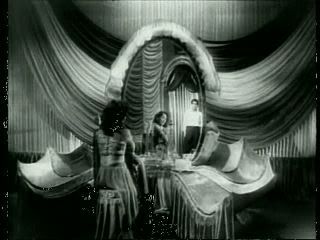
The set is pretty neat:
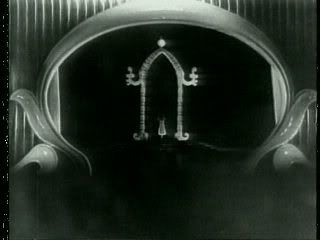
He broods very well:
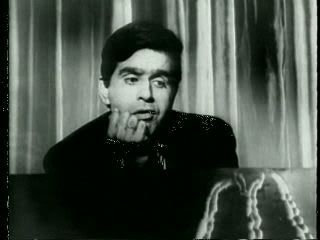
Paul, who doesn't win the fight in the theatre is not giving up this easily. Armed with a saw he makes sure that Kishore's ladder corresponds even less to health and safety requirements than it previously did. However, the evil intentions are foiled and Kishore makes it down safe and sound, much to Neelam's relief. Of course, this happy event requires another celebration with a song, and confirms her in her determination to make Kishore her own. Kishore points out to her that he is already taken and has no intentions of ever becoming romantically involved with her.
Evil intentions, the arty way:
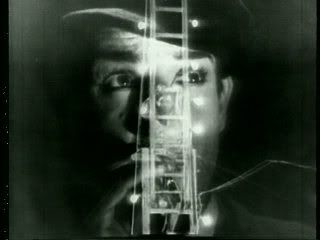
One can hardly tell that they might be up to no good:
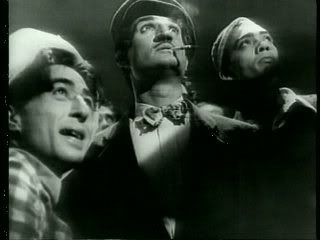
His lack of romantic interest may not be immediately obvious:
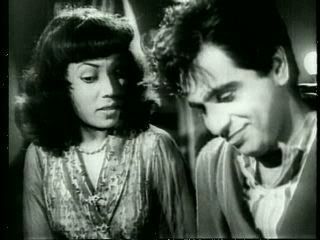
It becomes clearer, though:
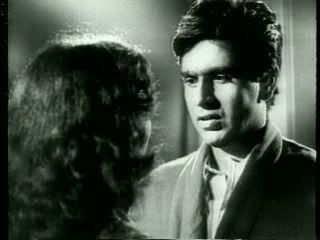
Neelam is not taking this news very well. In her rage she smashes one of the fish tanks and breaks the statue of a kissing couple. Paul comes to see her at just this moment and she asks him to kill Kishore; she wants to have him for ever and he will only be hers as a corpse (I do hope she has a large freezer, else there are going to be all sorts of unpleasant consequences). Paul is prepared to do this. After some stalking in artily arranged corridors he and Kishore have a fight; meanwhile Neelam is having second thoughts about killing the man she loves. It all ends with her being shot by Paul who was trying to kill Kishore, and Kishore (in the best movie tradition) picking up the gun. He ends up in jail having been convicted of Neelam's murder; and with this we are back in the present.
The poor fish:
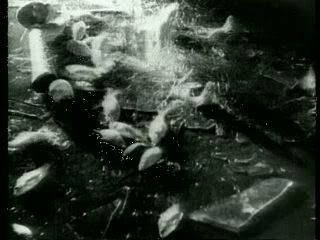
One of them I don't need in my mirror:
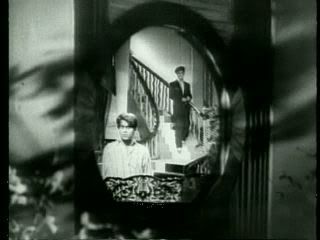
Dramatic camera angles; not necessarily a sign of sanity:

Poor guy:
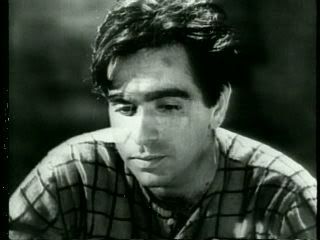
Back at the prison, the jailer finally finds the opportunity to unveil his bride, and, well, it's not really that much of surprise:
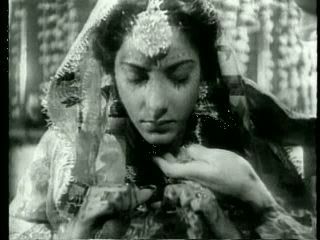
What will happen next? Will Kishore find out what happened to Asha? Will the jailer find out what relation his wife is to Kishore? Will there be more pining songs? And will anything be done about the fact that Kishore didn't in fact commit the murder?
I really like this movie. It is melodramatic and the end is unintentionally funny, and Neelam's overdecorated mansion reminded me of the Queen's palace in Uran Kathola, but none of these are bad things. And how could I not like a movie which has Dilip sporting blossoms in his hair? It also features a disappointed lover who doesn't drown his sorrows in alcohol. Instead, he uses the lesser known and less frequently found way of dealing with such disappoinments in Hindi cinema: chopping wood.
Of the three movies reviewed it's the one based most loosely on Wuthering Heights, while Dil Diya Dard Liya is the one which is closest, especially in the first half, which also makes it the one with the most unsympathetic characters (and I say this as someone who likes watching the movie). The latter also manages to cope with the fact that not everybody is paired off neatly at the end, something which Oonche Loog doesn't do; though of course those two have fairly happy endings. Also there the figure of the brother is redeemable, which it isn't in Dil Diya Dard Liya, whilst in Hulchul he just disappears. All in all, these are very different movies, even though they have been inspired by the same story.
Gratuitous lamp pictures (what?):
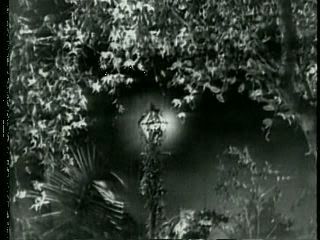
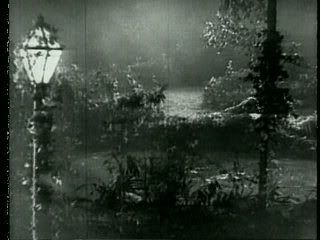

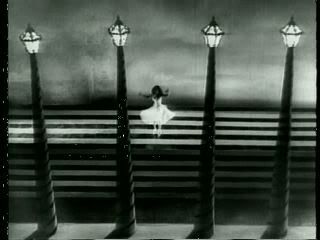
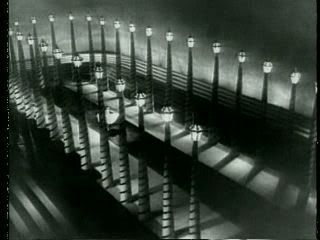
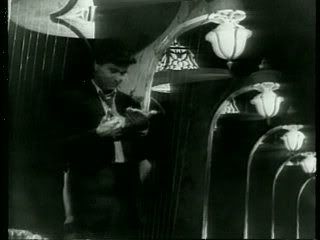
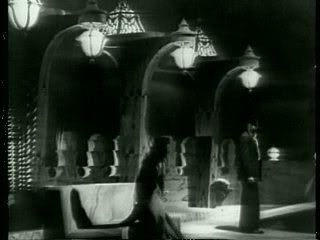
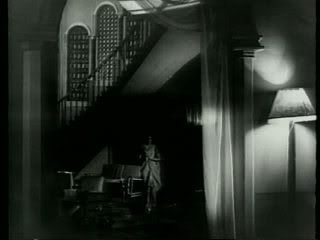
And a Balraj picture:
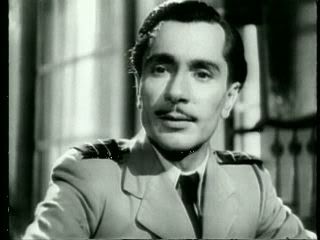
Okay, you can have some Dilip pictures, too:
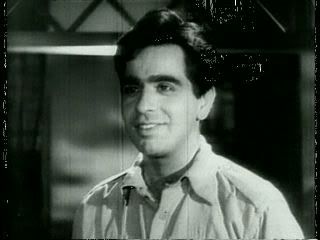


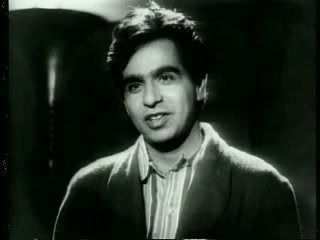
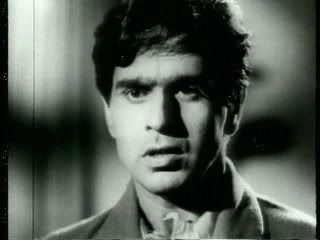
4 comments:
I bet Emily Bronte would have written in the stair-case death scene if she'd only thought of it - that alone would elevate Wuthering Heights into the so-bad-its-good melodrama category. ;-)
Balraj Sahni looks so pinched and thin! Ironically enough, he was living in jail when he shot for this film. He mentions in his biography that he'd come to sets escorted by a prison guard. He was also very envious of Dilip Kumar and Nargis's "natural" acting, and how they breezed through their scenes easily wrapping them up in fast takes. I guess he forgot all the melodrama in the film which required anything but natural acting!
Apparently, Heathcliff of Wurthering Heights is the most favourite role of Dilip Kumar.
Many thanks for reviewing Hulchul (1951). Could we please have the reviews of more Dilip Kumar movies?
About the large freezer: ha ha ha! Too true!
I don't have any idea what the director was up to with the lamp fetish, but nonetheless, I very much enjoyed your screenshots of them. Apparently I too like a good lamppost!
Bollyviewer -- I am not sure Emily Bronte had that much of a sense of humour.
That's sad about Balraj Sahni. He does a very good job, though his role is quite small.
Nasir -- Yes, he did Heathcliff twice. I am sure there will be more Dilip movies in the not too distant future.
Anarchivist -- The lampposts are quite amazing. I am glad I am not alone in my appreciation.
Post a Comment